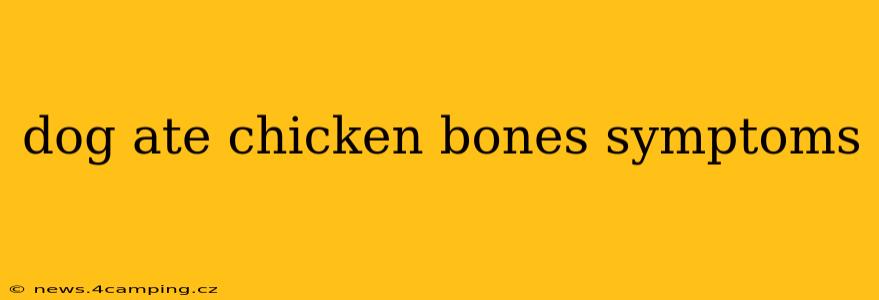Has your dog gotten into a discarded chicken carcass, and now you're worried about the chicken bones they ingested? It's a common scenario that can lead to serious consequences if not addressed properly. This comprehensive guide will cover the symptoms to watch for, potential treatments, and importantly, how to prevent this from happening again.
What Happens When a Dog Eats Chicken Bones?
Chicken bones, unlike larger, denser bones, are brittle and splinter easily. This is the primary danger. Once ingested, these sharp fragments can cause significant damage to your dog's digestive system. The smaller pieces can pierce the esophagus, stomach, or intestines, leading to internal bleeding, infection, and potentially life-threatening obstructions. Larger pieces might get lodged, causing blockages that require immediate veterinary intervention.
Symptoms of Chicken Bone Ingestion in Dogs
Recognizing the symptoms early is crucial for a positive outcome. Here's what to look for:
Sudden Vomiting and/or Diarrhea: This is a common initial reaction, often accompanied by visible blood in the vomit or stool.
Loss of Appetite: Your dog may refuse food, showing a significant decrease in their usual eating habits.
Lethargy and Weakness: A noticeable drop in energy levels and overall weakness is a serious sign requiring immediate veterinary attention.
Pawing at the Mouth: This indicates discomfort or pain in the mouth or throat area.
Excessive Drooling: An unusual amount of drool can point to irritation or injury in the mouth or esophagus.
Abdominal Pain: Your dog may exhibit signs of abdominal pain such as whimpering, restlessness, or a hunched posture.
Constipation or Straining to Defecate: Difficulty passing stool can be a sign of a bowel obstruction.
Swollen Abdomen: A visibly distended or swollen belly may indicate a blockage.
Vomiting that contains blood: This is a serious sign indicating internal damage. Seek immediate veterinary help.
Difficulty swallowing: If your dog seems to struggle while eating or drinking, this warrants immediate veterinary attention.
What to Do if Your Dog Eats Chicken Bones
Do not induce vomiting at home. This could worsen the situation by potentially pushing sharp bone fragments further into your dog’s digestive tract. Instead, contact your veterinarian immediately. Describe the situation fully, including how many bones were ingested, the size of the bones, and any symptoms your dog is exhibiting.
Treatment for Chicken Bone Ingestion
Treatment will depend on several factors, including the size and number of bones ingested, the size of your dog, and the severity of the symptoms. Your vet might recommend:
- Observation: In some cases, if the bones are small and your dog shows no significant symptoms, your vet may recommend close monitoring and watchful waiting. This involves regular checkups to assess the dog’s condition.
- Endoscopy: A procedure using a thin, flexible tube with a camera to visualize the digestive tract and remove any lodged bones.
- Surgery: In cases of severe blockage or internal injuries, surgery may be necessary to remove the bones and repair any damage.
How to Prevent Your Dog from Eating Chicken Bones
Prevention is key. Here are some crucial steps:
- Proper Disposal: Dispose of chicken bones responsibly, well out of reach of your dog, ideally in a sealed container or garbage bag.
- Supervise Mealtimes: Never leave cooked chicken (or other food scraps) unattended where your dog can access it.
- Train Your Dog: Teach your dog commands such as "leave it" and "drop it" to help manage their behavior around food.
- Secure Trash Cans: Use sturdy trash cans with secure lids to prevent your dog from getting into the garbage.
- Be Mindful of Guests: Remind visitors to dispose of chicken bones properly and to keep food items out of your dog's reach.
This information is for general knowledge and does not substitute professional veterinary advice. Always consult with your veterinarian if you suspect your dog has ingested chicken bones or any foreign object. Early intervention is crucial for a positive outcome.
